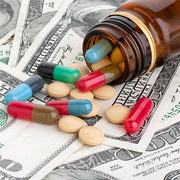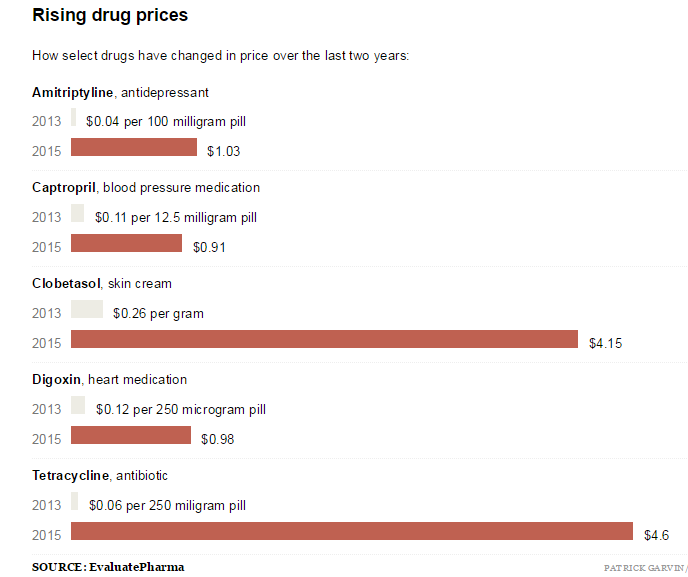Could New Legislation Stop the Hikes in Generic Drug Prices?
The Healthcare Supply Chain Association sent letters urging organizations to ensure providers and patients have greater access to medicine by creating a market in which hikes in generic drug prices are nonexistent.

- When it comes to containing healthcare costs, one of the biggest culprits of rising prices is the pharmaceutical industry, which has recently exhibited spikes in generic drug prices, according to a press release from the Healthcare Supply Chain Association.

The organization is urging Congress to try to address these rises in generic drug prices by allowing the Food and Drug Administration (FDA) to expedite the approval process for drug manufacturing in instances where there are only one or two companies producing a medication and price hikes have been evident.
The Healthcare Supply Chain Association sent letters urging organizations to ensure providers and patients have greater access to a number of important medicines by creating a market in which significant increases in generic drug prices are nonexistent.
The association sent letters to the US Senate Committee on Health, Education, Labor, and Pensions as well as the US Senate Special Committee on Aging. These letters urge the organizations to pursue legislation that can grant the FDA a quicker approval process for drug applications in markets where there are few manufacturers of generic medications.
“Significant recent price spikes in the generic drug market are an enormous risk to public health and are jeopardizing patient access to affordable healthcare,” HSCA President and CEO Todd Ebert stated in the press release.
“HSCA and its member group purchasing organizations are committed to lowering costs and increasing competition in the healthcare marketplace. We urge Congress to give FDA authority to expedite review and approval for new generic drugs that have the potential to mitigate price spikes and help ensure access to critical medications for healthcare providers and the patients they serve.”
HSCA President Todd Ebert wrote in the letter to the Committee on Health, Education, Labor, and Pensions how his organization is committed to lowering costs across the healthcare industry including cutting the rise in generic drug prices as well as promoting competition within the medical care marketplace.
The potential monopolies among one or two manufacturers leading to less competition and more price hikes makes it more difficult and sometimes impossible for providers and patients to receive life-saving medication.
There have already been significant drug price hikes in recent years. For example, the costs of two generic cardiac drugs rose by more than 2,700 percent in less than two years. In addition to the heart medication, a generic anti-parasitic compound rose to a 4,522 percent increase in costs.
“We have recently seen significant spikes for generic drugs where there are two or fewer manufacturers in the market, and where a lack of competition among manufacturers has allowed high prices to go largely unchecked. Limited manufacturing options also means that quality control problems and disruptions to manufacturing can jeopardize supply and exacerbate the ongoing problem of drug shortages,” Ebert wrote in the letter to the Senate Special Committee on Aging.
Currently, there is a large number of drug applications waiting for review by the FDA, which could be further leading to spikes in generic drug prices. The standard review time for the FDA has only risen over the years due to the Generic Drug User Fee Act, the press release explains. These are significant problems that can be addressed with the proper legislation.
Health payers would benefit tremendously from legislation that could potentially decrease the rising generic drug prices in the pharmaceutical market. Today, health insurers are left to cover the costs of the medications many patients need.
The rising costs can sometimes impact insurers’ abilities to pay for certain drugs, leaving a large portion of the costs for the patients themselves to cover. This can be a major problem for patients who do not have the funds for certain medications and are left unable to pay for lifesaving drugs.
“Generic price hikes and their effects – including making life-saving medications unaffordable for some patients – are an enormous risk to public health,” Ebert stated in the letter to the US Senate Committee on Health, Education, Labor, and Pensions. “Recently, we have seen significant spikes for many widely used generic drugs.”
The costs of generic drugs have been rising as much as 15 or 25 times what they once were a mere two years ago, the Boston Globe reports.
“We tend to focus heavily on the very expensive new drugs that are coming on the market,” Stuart Altman, chairman of the Health Policy Commission, told the news source. “But the idea that [costs for] the basic drugs that millions of Americans use — generics — are going up may turn out to be the more significant problem.”
In the state of Massachusetts, for example, prescription drug spending rose by 13 percent over the last year while overall medical care costs increased by 4.8 percent. This shows the deep impact that drug prices are having on the healthcare industry especially among payers and the patient community.
One survey from the National Community Pharmacists Association found significant jumps in generic drug prices especially among antibiotics for treating infection, a blood pressure medicine, one antidepressant, a skin cream, and a cardiac drug.
Many are blaming market consolidation on the rising costs. When there are only one or two manufacturers or a specific drug, there is practically a monopoly within the market.
“When there are three, four, five generic products, we have that competition,” Meredith Rosenthal, a health economist at the Harvard T.H. Chan School of Public Health, told the source. “When there are only two, prices are much higher. If there’s only one or two manufacturers, they essentially have monopoly power.”
However, if federal government agencies pursue legislation that could decrease the amount of time the FDA needs to review drug application requests, there could be more manufacturers developing generic drugs. Thereby, the market prices of these medications could drop imminently.

